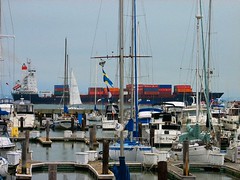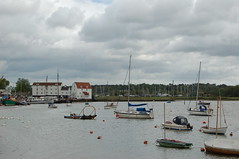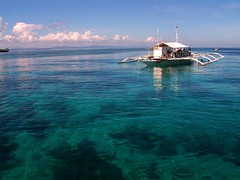While we were at TrawlerFest last week, I noticed many parallels between the boat and RV worlds. In particular, boats "camp" in very similar ways to RVs.
There are three broad categories of places to stay overnight in a boat. The first is a marina.

Photo by pbo31
Like RV parks, marinas often offer "full hookups." In the boat world, that usually means a shore power electrical connection, a water spigot nearby, and a pumpout station. There is often a fuel dock, restrooms, laundry room, restaurant, and other services within easy walking distance. Prices vary, but usually are charged by the length of the boat.
Marinas can range from rustic to resort-like, just like RV parks. The more touristy the destination, the pricier the dock. Some are membership-only, similar to Outdoor Resorts, and many require advance reservations.
Boat people choose marinas for many of the same reasons RVers like RV parks.
- Everything needed provided by the facility
- Feels safe
- Easy and comfortable to stay for an extended time
- Conveniently located to a given destination
- No need for a dingy; can step onto dock and walk
- No need to be conservative with water, power, food supplies
- Unable or unwilling to rely solely on boat's systems

Photo by Leslie Willis
A mooring location is a place that has been designated for boats to tie up. In the photo above, each vessel is tied to a ball that is anchored in place inside the harbor. Moorings can also be stakes, piers, or cleats along a dock. It is usually very clear that others have used that spot before you, and there is sometimes a small fee.
Moorings strike me as similar to rustic campgrounds, such as those in National Parks, National Forests, or many state parks. There are no hookups; the boat must be able to provide its own power and have enough water on board. Depending on the location, there may or may not be services nearby.
The advantages of mooring out are:
- Less expensive than marinas
- May be in a more natural setting
- More separation between boats
- Near enough to other boats for companionship and "safety in numbers"
- Clearly marked, no need to hunt for a place or guess if staying is permitted
- Usually first come, first served

Photo by storm crypt
Dropping anchor on your own is very similar to boondocking in the RV world. You choose the place, scope out the surrounding area, and are often completely on your own.
Anchoring near a town can be similar to urban dry camping at a WalMart. There are services nearby, but no place to get electricity, water or a place to dump tanks. Anchoring in a remote cove is more like dispersed camping in the backwoods, with quiet and solitude.
Mariners choose anchoring for some of these reasons:
- It may be the only choice; no marina or moorings
- Free
- Access to prime fishing locations
- Peace and quiet
- Solitude
- Unspoiled natural setting
- Feeling of independence
Of course, one big difference between boats and RVs is that boats move. A lot.
ReplyDeleteMarinas tend to be better sheltered as well. You'd be amazed at how much noise even little waves make when they slap against your bow.
My advice - get a boat with the master stateroom anywhere but in the bow!